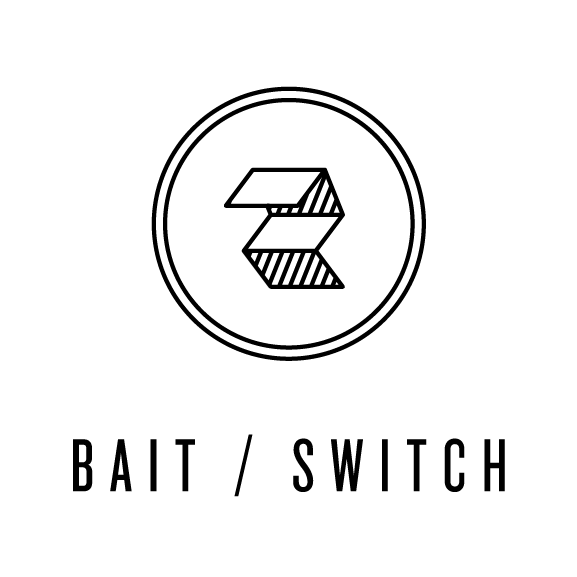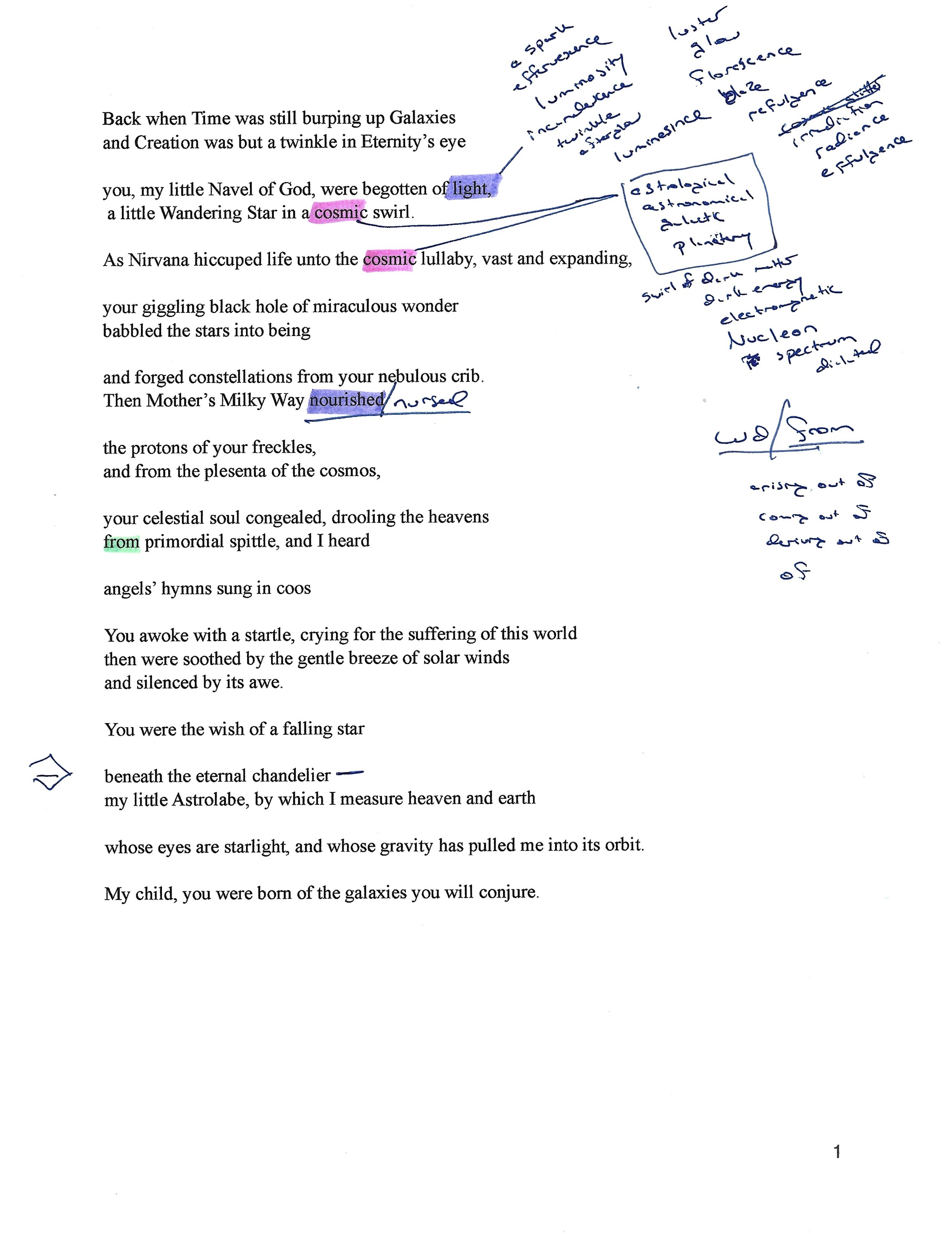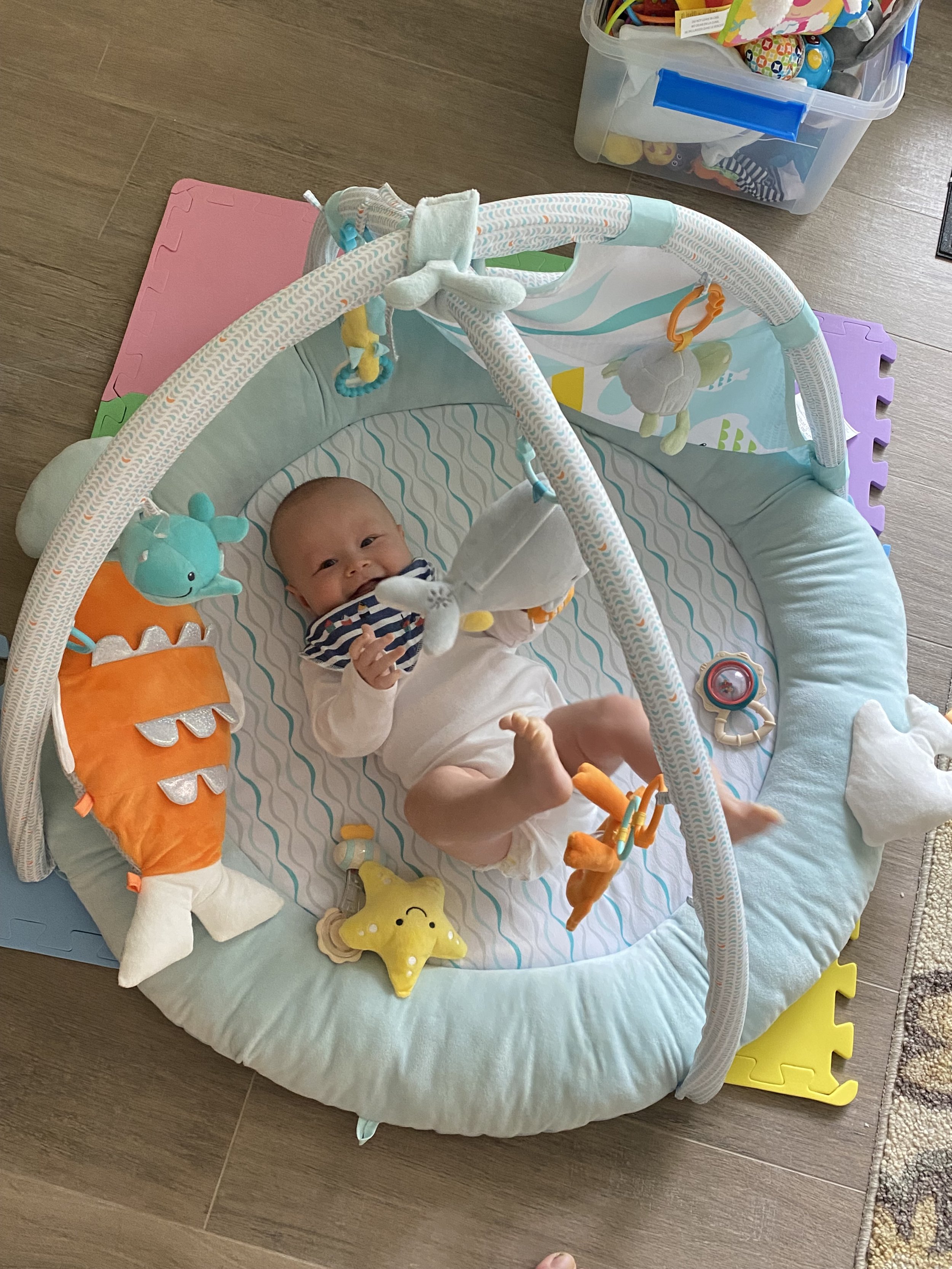Lancestronaut
Eliot Hudson
Back when Time was still burping up Galaxies
and Creation was but a twinkle in Eternity’s eye
you, my little Navel of God, were begotten of incandescence,
a little Wandering Star in a cosmic swirl.
As Nirvana hiccuped life unto this fledgling lullaby, vast and expanding,
Mother’s Milky Way nursed the constellation of your atoms,
until your giggling black hole of miraculous wonder
babbled the stars into being
drooling the heavens
from primordial spittle, and I heard
angels’ hymns sung in coos;
you awoke with a startle, crying for the suffering of this world
then were soothed by the gentle breeze of solar winds
and silenced by its awe.
You were the wish of a falling star
beneath the eternal chandelier—
my little Astrolabe, by which I measure heaven and earth
whose eyes are starlight, and whose gravity has pulled me into its orbit.
My child, you were born of the galaxies you will conjure.
“I’ve always said that religion is like language, in that there’s no such thing as one correct language over another.”
Interview by L. Valena
First of all, this is new. Usually when this process starts, the artist doesn’t know what the previous person was thinking about or anything when they made their piece. This is going to be really different for us. You’re kind of a guinea pig in this way. In three and a half years, we’ve never had a switch come about in this particular way!
Wow! I really appreciate that opportunity.
So to start, can you describe for me what you were responding to?
Yeah. My friend Darrel Perkins now lives in Dubai, and he was coming to visit me. Actually, we’ve done some companion pieces before. I’ve written poems and he’s illustrated or created linos to them and vice versa. I think this might have been only the second or third time that we’ve ever worked together, though we’re very, very good friends, and he is very often an inspiration for me and vice versa. So I just love seeing the things that he creates. Darrel knew that he was going to come and see my son, Lance, and so he drew this idea of a baby looking up in a crib at a mobile and the mobile also illustrates the galaxy. He had shown me the piece that he had responded to, which was fabric. It was a dark fabric and there was some stitching down the way and there were some speckles, so to speak, that were that were sewn into it, which is obviously fantastic. Not only is it one responding to the other, but the entire word “text” that we use so often comes from the Latin “to weave.” That’s where we get “texture” and other words. And here, it started from that artist to Darrel to me. It started as weaving, and then Darrel was the next thread so to speak, and then I continued on in that vein with text. So it starts from the one and then gets to the other.
But it was Darrel’s view of the Cosmos that really helped influence where and how I was to orient my piece. We very much feed and respond off of one another which I think is exactly what Bait/Switch is tapping into. It’s how creativity begets creativity, and nobody’s an empty vessel just floating around. We’re responding constantly to what we see and how we interact with others. It’s always a communication, whether you choose to communicate with words or through various physical properties or through sound.
So Darryl’s view of the Cosmos got you started. Where did you go from there?
Similarly, it’s always what you’re reading and what art you’re looking at which helps inform your thought process. Lately, I’ve been reading a lot of pourquoi stories. It’s like How the Elephant Got His Trunk and things in that vein. You know, like fables. Because I was reading that and because Darrel showed such an origin-of-the-world type of thing, what with the newborn infant and galaxies and swirling, and that it’s begotten from the imagination as the child looks up into the heavens, my mind just started swirling and conjuring. We would have those late-night discussions where we would talk about the origins of the world and things like that. It’s in those moments where you get little glimpses of the fantastic, and if you can just capture that, either within a drawn piece or with words, hopefully you can encapsulate those moments.
I would love to hear more about this piece. I love that it seems like you’re speaking directly to your son. On its own, what does this piece say to you now?
It’s sort of like the origin stories. Each night when I put him to bed, I read. Lately, it’s been Norse mythology. There’s a wolf character and they keep trying to tether him and he keeps breaking the chains. The only way that they’re able to fetter him is with a ribbon made with the sinews of a bear, the footsteps of a cat, and various other things. So those things no longer exist. Cats’ footsteps are very quiet now. It was those things that were taken from the world to fetter this wolf, who at the end of the universe is going to be untethered and run amok again. So I was reading him that and it sparked an instigation for imagination. It makes you wonder what else has and hasn’t existed.
And when you start shifting things the physical and the metaphysical, that’s when you can get some fun, interesting ideas. For example, you don’t think of a cat’s footsteps as being able to create a ribbon, so you don’t think about time being able to birth galaxies or creation but a twinkle in eternity’s eye. It’s how one relates to another. That’s an interesting way that language is able to discuss the relationship between various concepts that are sometimes more difficult to conjure in a painting or otherwise. I just like this idea of trying to put a verb to an inanimate concept like “Nirvana hiccupping.” And there was a moment when I thought perhaps Nirvana and Karma could be flirting at one moment, but then I was like, No no no, we’ll let that be another poem in itself.
So interesting. I wonder what they’re saying to each other.
Yeah, exactly. “Come around here often?”
[sing-song] “I know something you don’t know!”
Can you talk some more about your feelings about the Cosmos? How does that manifest in your day-to-day life or affect your view of the world?
Absolutely. Well, in this piece, we get a few allusions to religion and things like that. Obviously, there’s Nirvana from the Hindu traditions. There’s some moment where it says “begotten of incandescence”, which is in reference to Christ being begotten, not born, from the Nicene Creed. I’ve always said that religion is like language, in that there’s no such thing as one correct language over another. Instead, all religions are a way to describe the non-physical. So, in such a way, we can bring various pieces of language from various traditions and try to create this tapestry that is a poem or an expression or even an understanding of the world. In such a way that I can be soothed by ideas of Buddhism or impermanence, I can also access language from a Christian tradition to help soothe myself. However, much like language, I do find that people are most comfortable in that which they’ve been born into and grown up in. That’s obviously why I’m speaking English here. My wife is Russian, so our son will be speaking both of those. I do not speak Russian, so I couldn’t put Russian in here, but that’s why I think it’s important to, if you can, integrate different pieces of language. I think this language is the only way that we can express that which is not physical, that which we don’t know. And I have a feeling that there’s not necessarily a heaven or hell after this life. I feel like there’s probably going to be some type of primordial spittle or energy, and it will be like some type of cosmic chandelier that we won’t be able to fully grasp, and will be just out of our reach, but we will be incorporated with it. That’s why, at the end, I liked that idea of “My child you were born of the galaxies you will conjure.” It’s the thing into the thinging, as the phenomenologists say.
The thingness of the thing?
Yeah, exactly!
I can’t remember which theorist talks about that. I think it’s Heidegger. I know the phenomenologists were into that too. Do you have any advice for someone else who’s going to go through this process?
Of writing or childbirth? [laughs]
Have you given birth? Can you give advice? I don’t know if you’re the right one to ask.
From everything I’ve seen, I want no part of it! [both laugh]
What I meant was advice for somebody else approaching this project for the first time, responding to a prompt like this.
Oh right! Just let yourself go. You know, this project does help make you look more at yourself. I never thought too much about my process, but then I started realizing what that process was. I get something and I feel something. If I feel something, then what are the images that it conjures from that? Then what kind of vocabulary? Then I try to find other poets that can help inform the mood and the mystique. For this project, I ended up looking at Yesung from South Korea, Jacob Glatstein who’s a Polish Yiddish poet, and JV Fox who’s Catalan. So it’s not just what you’re given, it’s all the things that surround and swirl about you, and then you just fuse them together and it gets passed on to another person. It’s just so beautiful in that way.
Awesome. Anything else that I didn’t ask you about that you want to mention?
This is just so fun and it’s such a good metaphor for what art is and what we experience in this world, what you find, what you take with it, and what you can create. I mean, it’s just so apropos.
Call Number: Y60VA | Y63PP.huLa
Eliot Hudson has just finished his first novel and is currently seeking representation. He’s read at the Popsickle Brooklyn Literary Festival, the Edinburgh Fringe Festival, and was shortlisted for the Solstice Shorts Festival 2019 (Arachne Press)—to view more of his publications please visit his website: EliotHudson.com. Additionally, he writes music and his award winning song “Sinners in Church” is currently available on iTunes, Spotify, and Youtube.




